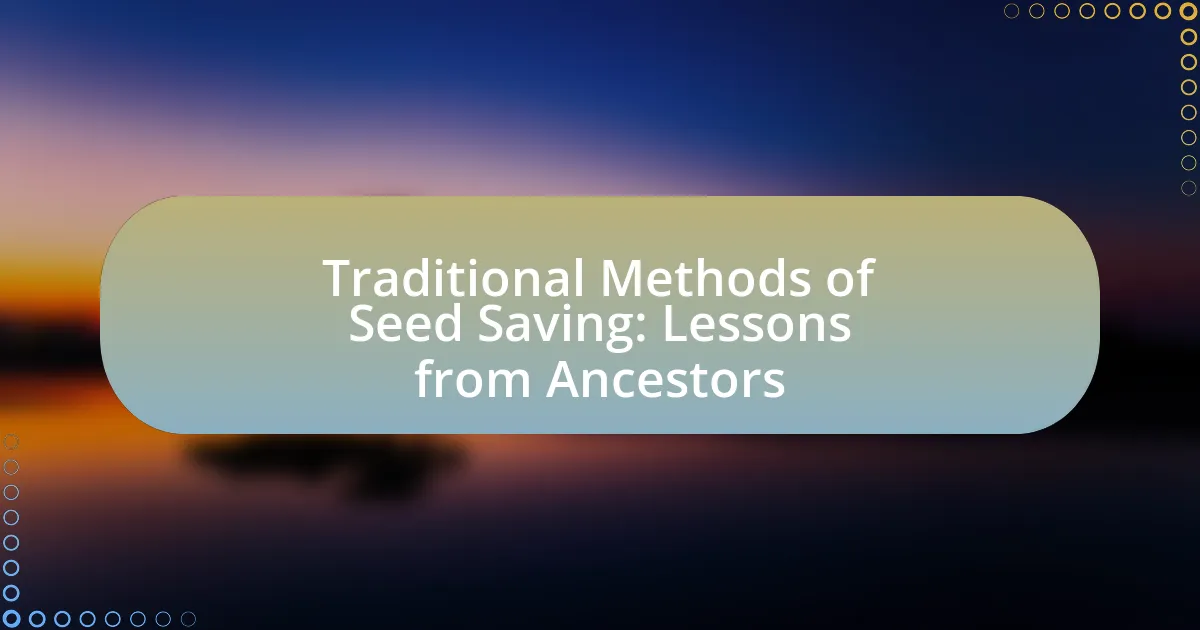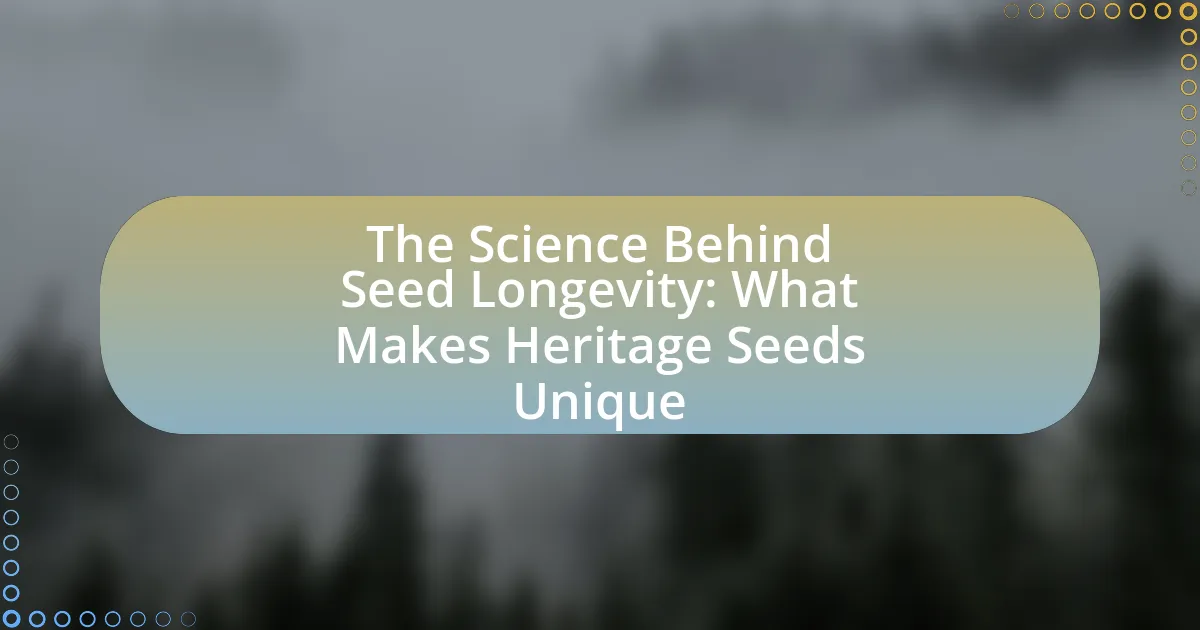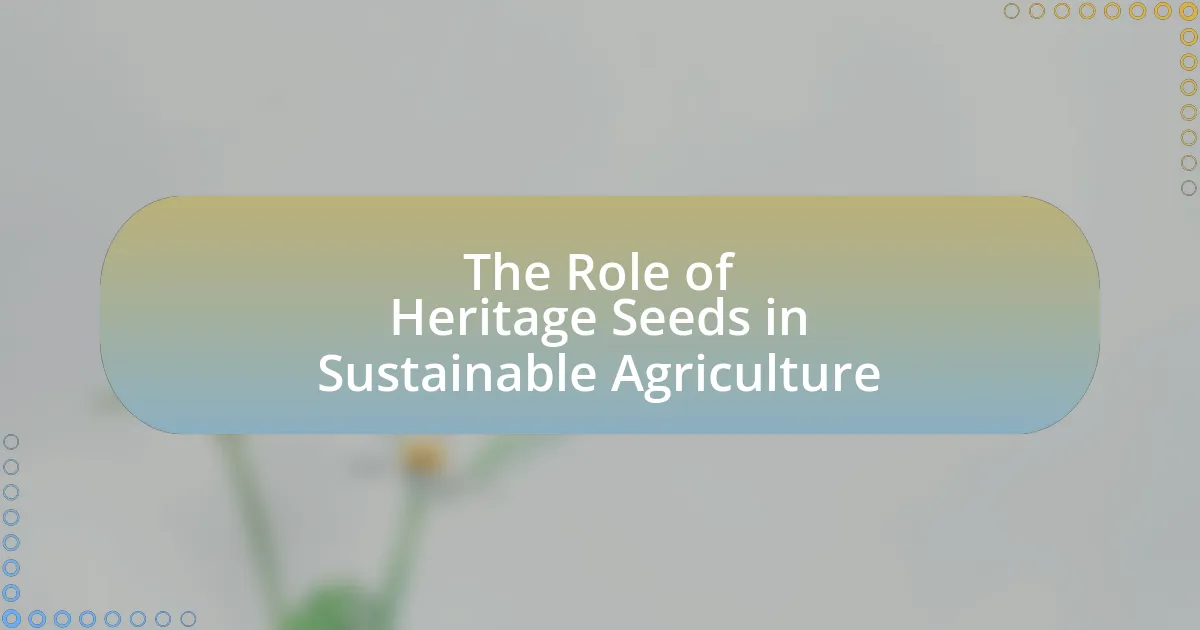Heritage seeds are traditional varieties that play a vital role in food security by preserving genetic diversity and promoting sustainable agricultural practices. This article explores the significance of heritage seeds in enhancing food availability, resilience against climate change, and nutritional quality. It examines their unique characteristics, differences from hybrid and genetically modified seeds, and their contributions to biodiversity and local food systems. Additionally, the article addresses the challenges heritage seeds face in modern agriculture, the economic implications for farmers, and strategies for integrating these seeds into current food systems. Finally, it discusses the future prospects for heritage seeds in ensuring food security and the importance of policy changes and international cooperation in their preservation.

What is the role of heritage seeds in food security?
Heritage seeds play a crucial role in food security by preserving genetic diversity and enabling sustainable agricultural practices. These seeds, often heirloom varieties, are adapted to local climates and conditions, which enhances resilience against pests, diseases, and climate change. Research indicates that heritage seeds can yield crops with better nutritional profiles and greater adaptability, contributing to food availability and stability. For instance, a study published in the journal “Agricultural Systems” highlights that diverse cropping systems, including heritage varieties, can increase food production by up to 30% in marginal environments. Thus, heritage seeds are essential for ensuring a stable and resilient food supply.
How do heritage seeds contribute to sustainable agriculture?
Heritage seeds contribute to sustainable agriculture by preserving genetic diversity and promoting resilience in crop production. These seeds, often adapted to local climates and conditions, enhance biodiversity, which is crucial for ecosystem stability and agricultural sustainability. Research indicates that heritage seeds can withstand pests and diseases better than many modern hybrids, reducing the need for chemical inputs. For example, a study published in the journal “Agriculture, Ecosystems & Environment” found that farms using heritage varieties had a 30% lower incidence of crop failure due to environmental stressors compared to those relying solely on commercial seeds. This resilience supports food security by ensuring a stable supply of crops in the face of climate change and other challenges.
What are the unique characteristics of heritage seeds?
Heritage seeds are characterized by their genetic diversity, adaptability, and historical significance. These seeds are open-pollinated, meaning they can reproduce true to type, allowing farmers to save seeds from one harvest for future planting. Heritage seeds often possess traits that have been selected over generations, such as resilience to local pests and diseases, which enhances food security. Additionally, they are typically non-GMO and have been cultivated in specific regions for many years, preserving unique flavors and nutritional profiles. This historical cultivation contributes to biodiversity, which is essential for sustainable agriculture and food systems.
How do heritage seeds differ from hybrid and genetically modified seeds?
Heritage seeds differ from hybrid and genetically modified seeds primarily in their genetic makeup and breeding processes. Heritage seeds are open-pollinated varieties that have been passed down through generations, maintaining their genetic integrity and traits over time, while hybrid seeds are created through controlled cross-pollination of different plant varieties to produce specific traits, and genetically modified seeds involve direct manipulation of an organism’s DNA in a laboratory to introduce new characteristics. Heritage seeds are often valued for their biodiversity, adaptability to local conditions, and traditional agricultural practices, whereas hybrid and genetically modified seeds are typically designed for higher yields, pest resistance, or specific environmental conditions. The preservation of heritage seeds is crucial for food security, as they contribute to genetic diversity and resilience in agriculture.
Why are heritage seeds important for biodiversity?
Heritage seeds are crucial for biodiversity because they preserve genetic diversity within plant species, which is essential for ecosystem resilience and adaptability. These seeds represent traditional varieties that have been cultivated over generations, often possessing unique traits that can withstand pests, diseases, and climate variations. For instance, a study by the Food and Agriculture Organization (FAO) highlights that maintaining a diverse gene pool through heritage seeds can enhance food security by providing options for breeding new varieties that can adapt to changing environmental conditions. This genetic diversity is vital for sustainable agriculture and the overall health of ecosystems.
What role do heritage seeds play in preserving plant genetic resources?
Heritage seeds play a crucial role in preserving plant genetic resources by maintaining biodiversity and enabling the cultivation of resilient crops. These seeds, often heirloom varieties, have been passed down through generations and possess unique traits that can adapt to changing environmental conditions. For instance, heritage seeds contribute to genetic diversity, which is essential for breeding programs aimed at developing new varieties that can withstand pests, diseases, and climate change. Research indicates that over 90% of the world’s food supply comes from just 30 crops, highlighting the importance of preserving diverse genetic resources to ensure food security. By cultivating heritage seeds, farmers can safeguard against the loss of genetic diversity, thereby enhancing agricultural resilience and sustainability.
How does biodiversity impact food security?
Biodiversity significantly impacts food security by enhancing ecosystem resilience, which is crucial for sustainable agricultural production. Diverse ecosystems support a variety of crops and livestock, reducing vulnerability to pests, diseases, and climate change. For instance, a study published in the journal “Nature” found that agricultural systems with higher biodiversity can yield up to 20% more food than monocultures, as they utilize resources more efficiently and maintain soil health. This increased productivity directly contributes to food availability and stability, essential components of food security.
What challenges do heritage seeds face in modern agriculture?
Heritage seeds face significant challenges in modern agriculture, primarily due to industrial farming practices that favor high-yield, genetically modified crops. These practices lead to a decline in biodiversity, as heritage seeds are often less commercially viable and receive less support from agricultural policies. Additionally, heritage seeds are more susceptible to pests and diseases in monoculture systems, which can diminish their viability. According to a report by the Food and Agriculture Organization, over 75% of crop diversity has been lost since the 1900s, highlighting the urgent need to preserve heritage seeds for food security and resilience against climate change.
How do climate change and environmental factors affect heritage seeds?
Climate change and environmental factors significantly impact heritage seeds by altering their growing conditions and reducing genetic diversity. Changes in temperature and precipitation patterns can lead to increased stress on these seeds, making them less resilient to pests and diseases. For instance, a study published in the journal “Agricultural Systems” found that rising temperatures can decrease the yield of traditional crops by up to 30% in certain regions. Additionally, extreme weather events, such as droughts and floods, can further threaten the viability of heritage seeds, as they often rely on specific environmental conditions for optimal growth. This vulnerability underscores the importance of preserving genetic diversity in heritage seeds to ensure food security in the face of climate change.
What are the economic challenges associated with heritage seed cultivation?
Heritage seed cultivation faces several economic challenges, primarily including limited market access, higher production costs, and competition from hybrid seeds. Limited market access arises because heritage seeds often lack the marketing support and distribution networks that hybrid seeds enjoy, making it difficult for farmers to sell their produce. Higher production costs are associated with the need for more labor-intensive farming practices and lower yields compared to hybrid varieties, which can deter farmers from adopting heritage seeds. Additionally, competition from hybrid seeds, which are often promoted for their higher productivity and pest resistance, further complicates the economic viability of heritage seed cultivation. These factors collectively hinder the widespread adoption of heritage seeds, impacting their role in food security.
How can heritage seeds be integrated into current food systems?
Heritage seeds can be integrated into current food systems by promoting biodiversity and resilience in agriculture. These seeds, which are traditional varieties passed down through generations, can enhance food security by providing crops that are better adapted to local climates and conditions. Research indicates that heritage seeds often possess traits such as drought resistance and pest tolerance, which are crucial for sustainable farming practices. For example, a study published in the journal “Agriculture, Ecosystems & Environment” highlights that farms utilizing heritage seeds can yield crops with higher nutritional value and lower environmental impact compared to monoculture systems. By incorporating heritage seeds into crop rotations and community-supported agriculture programs, farmers can diversify their production and contribute to a more sustainable food system.
What strategies can farmers adopt to utilize heritage seeds effectively?
Farmers can adopt several strategies to utilize heritage seeds effectively, including crop rotation, intercropping, and organic farming practices. Crop rotation helps maintain soil health and reduces pest and disease pressure, which is crucial for the success of heritage varieties that may be less resilient than modern hybrids. Intercropping, or planting different crops in proximity, can enhance biodiversity and improve yields by utilizing different growth habits and nutrient needs. Organic farming practices, such as composting and natural pest control, support the sustainable growth of heritage seeds, which often thrive in less chemically intensive environments. Research indicates that these methods not only improve the viability of heritage seeds but also contribute to overall food security by promoting diverse and resilient agricultural systems.
How can consumers support the use of heritage seeds?
Consumers can support the use of heritage seeds by purchasing them from local farmers and seed banks that specialize in these varieties. By choosing heritage seeds, consumers help maintain biodiversity and promote sustainable agricultural practices. Research indicates that heritage seeds often possess greater resilience to pests and climate change, which is crucial for food security. Additionally, consumers can participate in community-supported agriculture (CSA) programs that prioritize heritage varieties, thereby directly contributing to the preservation of these seeds.

What are the benefits of using heritage seeds for food security?
Heritage seeds enhance food security by promoting biodiversity, resilience, and sustainable agriculture. These seeds are often adapted to local climates and conditions, which increases crop yields and reduces dependency on chemical inputs. For instance, a study by the Food and Agriculture Organization (FAO) highlights that heritage seeds can withstand pests and diseases better than many modern hybrids, leading to more stable food supplies. Additionally, heritage seeds contribute to the preservation of genetic diversity, which is crucial for adapting to climate change and ensuring long-term agricultural sustainability.
How do heritage seeds enhance food sovereignty?
Heritage seeds enhance food sovereignty by promoting biodiversity and enabling local communities to control their food sources. These seeds are often adapted to specific local climates and conditions, which increases resilience against pests and diseases. For example, studies show that diverse crop varieties can lead to higher yields and better nutritional outcomes, as seen in regions where farmers cultivate heritage varieties. By preserving traditional agricultural practices and knowledge, heritage seeds empower communities to maintain their cultural identity and reduce dependence on industrial agriculture, thus fostering self-sufficiency and food security.
What is the relationship between heritage seeds and local food systems?
Heritage seeds are integral to local food systems as they promote biodiversity, preserve traditional agricultural practices, and enhance food sovereignty. These seeds, often adapted to local climates and conditions, enable farmers to cultivate crops that are resilient and suited to their specific environments. Research indicates that using heritage seeds can lead to improved crop yields and nutritional diversity, which are essential for sustainable local food systems. For instance, a study by the Food and Agriculture Organization highlights that heritage varieties can contribute to food security by providing a wider range of food options and reducing dependency on commercial seed varieties.
How do heritage seeds empower smallholder farmers?
Heritage seeds empower smallholder farmers by providing them with access to diverse, locally adapted varieties that enhance food security and resilience. These seeds are often more resilient to local pests and diseases, which reduces the need for chemical inputs and lowers production costs. Additionally, heritage seeds promote biodiversity, allowing farmers to cultivate crops that are better suited to their specific environmental conditions. Studies have shown that using heritage seeds can lead to increased yields and improved nutritional quality of food, thereby supporting the livelihoods of smallholder farmers and their communities.
What nutritional advantages do heritage seeds offer?
Heritage seeds offer enhanced nutritional advantages compared to conventional seeds, primarily due to their genetic diversity and adaptability. These seeds often contain higher levels of essential nutrients, such as vitamins, minerals, and antioxidants, which are critical for human health. For instance, research has shown that certain heritage varieties of tomatoes have significantly higher concentrations of lycopene, a powerful antioxidant, compared to hybrid varieties. Additionally, heritage seeds are typically grown in more sustainable agricultural practices, which can lead to healthier soil and, consequently, more nutrient-dense crops. This relationship between soil health and crop nutrition is supported by studies indicating that organic farming methods, often associated with heritage seed cultivation, can increase the nutrient content of produce.
How do heritage seeds compare nutritionally to modern varieties?
Heritage seeds generally offer higher nutritional value compared to modern varieties. Research indicates that heritage varieties often contain greater levels of vitamins, minerals, and antioxidants, which can contribute to better overall health. For instance, a study published in the Journal of Agricultural and Food Chemistry found that heirloom tomatoes had significantly higher levels of vitamin C and phenolic compounds than their hybrid counterparts. This nutritional superiority is attributed to the diverse genetic makeup of heritage seeds, which allows for a broader range of nutrients to be expressed in the plants.
What are the health benefits associated with consuming heritage crops?
Heritage crops provide several health benefits, including higher nutritional value, improved biodiversity, and potential disease resistance. These crops often contain more vitamins, minerals, and antioxidants compared to modern varieties, contributing to better overall health. For instance, studies have shown that heritage grains like spelt and einkorn have higher protein content and essential fatty acids. Additionally, the genetic diversity of heritage crops can enhance resilience against pests and diseases, reducing the need for chemical pesticides, which can have adverse health effects. This diversity also supports gut health by providing a wider range of dietary fibers and nutrients.
How do heritage seeds contribute to climate resilience?
Heritage seeds contribute to climate resilience by preserving genetic diversity that enables crops to adapt to changing environmental conditions. This genetic variability allows for better resistance to pests, diseases, and extreme weather events, which are increasingly prevalent due to climate change. For instance, a study published in the journal “Agricultural Systems” highlights that heritage varieties often possess traits such as drought tolerance and flood resistance, which are crucial for maintaining agricultural productivity in unpredictable climates. By utilizing these seeds, farmers can enhance food security and sustainability in the face of climate challenges.
What traits of heritage seeds make them more adaptable to changing climates?
Heritage seeds exhibit traits such as genetic diversity, resilience to pests and diseases, and adaptability to local environmental conditions, making them more suitable for changing climates. Genetic diversity allows these seeds to possess a wider range of traits that can respond to various stressors, such as drought or temperature fluctuations. Additionally, heritage seeds have often been selected over generations for their ability to thrive in specific local conditions, which enhances their resilience. Studies have shown that traditional varieties can outperform modern hybrids in adverse conditions, demonstrating their adaptability and importance for food security in the face of climate change.
How can heritage seeds help mitigate the effects of climate change on agriculture?
Heritage seeds can help mitigate the effects of climate change on agriculture by providing genetic diversity that enhances resilience to changing environmental conditions. This genetic diversity allows crops to adapt to stressors such as drought, pests, and diseases, which are exacerbated by climate change. For instance, studies have shown that heritage varieties often possess traits that enable them to thrive in less-than-ideal conditions, such as lower water availability or higher temperatures. Additionally, heritage seeds have been cultivated over generations, leading to a better understanding of their growth patterns and adaptability, which can be crucial for sustainable farming practices in a changing climate.

What are the future prospects for heritage seeds in ensuring food security?
Heritage seeds have promising future prospects in ensuring food security due to their genetic diversity, resilience to climate change, and adaptability to local conditions. These seeds, which are traditional varieties passed down through generations, possess traits that can withstand pests, diseases, and extreme weather, making them crucial for sustainable agriculture. Research indicates that heritage seeds can enhance biodiversity, which is essential for ecosystem stability and food production. For instance, a study published in the journal “Agriculture, Ecosystems & Environment” highlights that diverse cropping systems utilizing heritage seeds can lead to improved yields and reduced reliance on chemical inputs. This adaptability and resilience position heritage seeds as vital components in addressing the challenges of global food security in the face of climate change and population growth.
How can policy changes support the use of heritage seeds?
Policy changes can support the use of heritage seeds by implementing regulations that protect and promote their cultivation. For instance, governments can establish legal frameworks that recognize and safeguard the intellectual property rights of farmers who grow heritage seeds, thereby encouraging their use. Additionally, policies can provide financial incentives, such as subsidies or grants, to farmers who choose to cultivate heritage varieties, which can enhance biodiversity and resilience in agriculture. Evidence from the Food and Agriculture Organization indicates that countries with supportive policies for traditional seed systems see increased adoption rates of heritage seeds, contributing to food security and sustainable agricultural practices.
What role do governments play in promoting heritage seed initiatives?
Governments play a crucial role in promoting heritage seed initiatives by implementing policies that support biodiversity, funding research, and facilitating education on sustainable agriculture. For instance, many governments establish programs that provide financial incentives for farmers to cultivate heritage seeds, which helps preserve genetic diversity and traditional farming practices. Additionally, governments often collaborate with agricultural organizations to create awareness campaigns that highlight the importance of heritage seeds in food security, as evidenced by initiatives like the United Nations’ Food and Agriculture Organization’s efforts to promote agrobiodiversity. These actions not only enhance food security but also contribute to environmental sustainability by encouraging the use of locally adapted seed varieties.
How can international cooperation enhance the preservation of heritage seeds?
International cooperation can enhance the preservation of heritage seeds by facilitating the sharing of genetic resources, knowledge, and best practices among countries. Collaborative efforts, such as the International Treaty on Plant Genetic Resources for Food and Agriculture, promote the exchange of seeds and agricultural techniques, ensuring diverse genetic material is maintained. This cooperation helps safeguard against biodiversity loss and supports food security by enabling countries to access a wider variety of heritage seeds, which are crucial for adapting to climate change and evolving agricultural challenges.
What innovations are emerging in the field of heritage seeds?
Innovations in the field of heritage seeds include the development of seed banks, advanced breeding techniques, and digital platforms for seed sharing. Seed banks, such as the Svalbard Global Seed Vault, preserve genetic diversity and ensure the availability of heritage seeds for future generations. Advanced breeding techniques, including marker-assisted selection, enhance the resilience and adaptability of heritage varieties to climate change and pests. Additionally, digital platforms like SeedLinked facilitate the exchange of heritage seeds among farmers, promoting biodiversity and sustainable agriculture practices. These innovations collectively support food security by maintaining genetic diversity and improving crop resilience.
How is technology being used to support heritage seed conservation?
Technology is being used to support heritage seed conservation through advanced genetic analysis, seed banking, and digital platforms for knowledge sharing. Genetic analysis techniques, such as DNA sequencing, allow researchers to identify and preserve the genetic diversity of heritage seeds, ensuring their unique traits are maintained. Seed banking employs cryopreservation methods to store seeds at low temperatures, significantly extending their viability and protecting them from extinction. Additionally, digital platforms facilitate collaboration among farmers, scientists, and conservationists, enabling the sharing of best practices and data on heritage seed varieties, which enhances conservation efforts. These technological applications are crucial for maintaining biodiversity and ensuring food security in the face of climate change and industrial agriculture pressures.
What are the potential impacts of research on heritage seeds?
Research on heritage seeds can significantly enhance biodiversity, improve food security, and promote sustainable agricultural practices. By studying heritage seeds, researchers can identify traits that contribute to resilience against pests, diseases, and climate change, which is crucial as global food demands increase. For instance, heritage varieties often possess unique genetic traits that can be utilized in breeding programs to develop new cultivars that are better adapted to local conditions. Furthermore, research can lead to the preservation of these seeds, ensuring that traditional agricultural knowledge and practices are maintained, which is vital for cultural heritage and community identity. Studies have shown that diverse cropping systems, which include heritage seeds, can lead to increased yields and reduced reliance on chemical inputs, thereby promoting environmental sustainability.
What practical steps can individuals take to promote heritage seeds?
Individuals can promote heritage seeds by participating in seed saving and sharing initiatives. Engaging in local seed exchanges allows individuals to preserve genetic diversity and maintain traditional varieties. Additionally, individuals can cultivate heritage seeds in their gardens, demonstrating their viability and encouraging others to do the same. Educating the community about the benefits of heritage seeds, such as their adaptability and resilience, further supports their promotion. Research indicates that heritage seeds contribute to food security by enhancing biodiversity, which is crucial for adapting to climate change.
How can community gardens incorporate heritage seeds into their programs?
Community gardens can incorporate heritage seeds into their programs by establishing seed-saving initiatives and educational workshops. These initiatives allow gardeners to cultivate and preserve traditional varieties, promoting biodiversity and cultural heritage. For instance, the Seed Savers Exchange, a nonprofit organization, emphasizes the importance of preserving heirloom seeds, which can enhance food security by providing diverse crop options that are often more resilient to pests and diseases. By integrating heritage seeds into their planting schedules and sharing knowledge about their cultivation, community gardens can foster a deeper connection to local agricultural history and contribute to sustainable food systems.
What resources are available for learning about heritage seed cultivation?
Resources available for learning about heritage seed cultivation include books, online courses, and community workshops. Notable books such as “Seed to Seed” by Suzanne Ashworth provide comprehensive guides on seed saving and cultivation techniques. Online platforms like the Seed Savers Exchange offer webinars and articles focused on heritage seeds. Additionally, local agricultural extension services often conduct workshops that educate farmers and gardeners on the importance and methods of heritage seed cultivation. These resources are validated by their widespread use in educational programs and their contributions to preserving biodiversity in agriculture.





